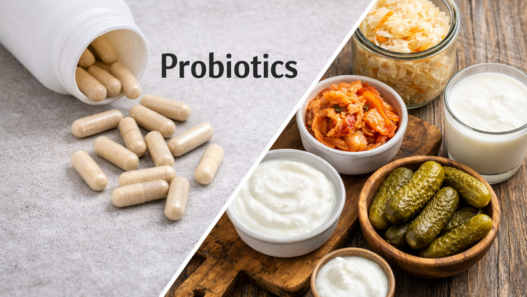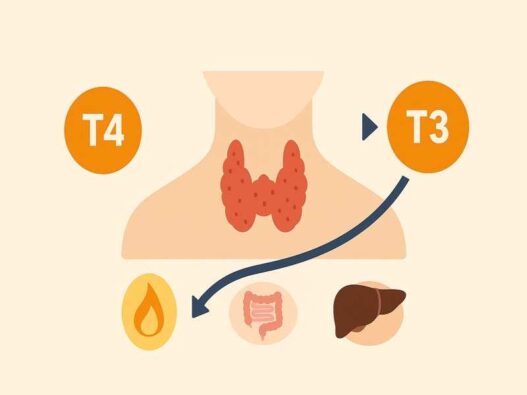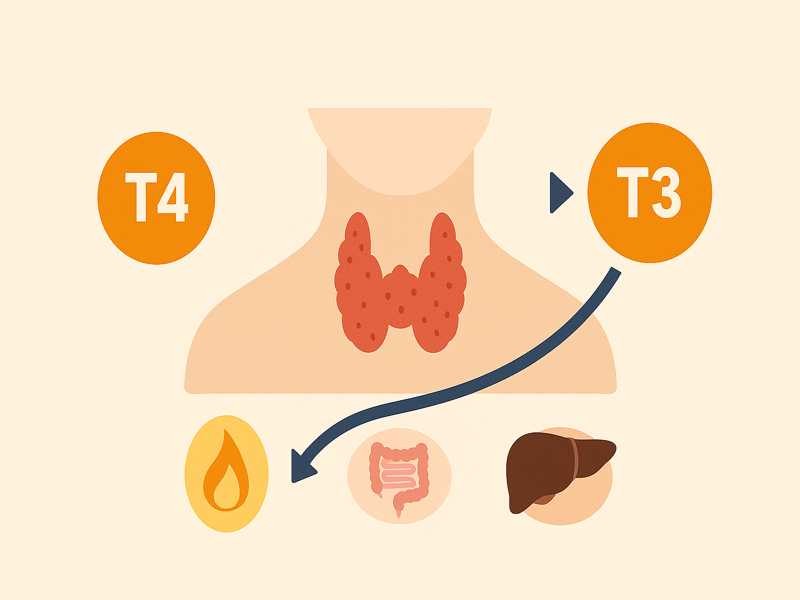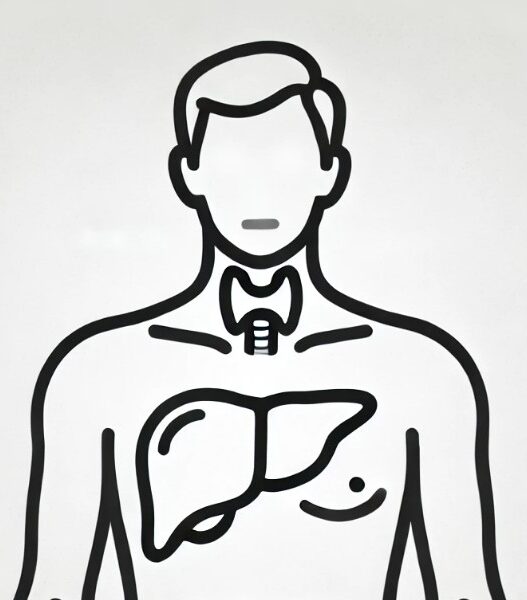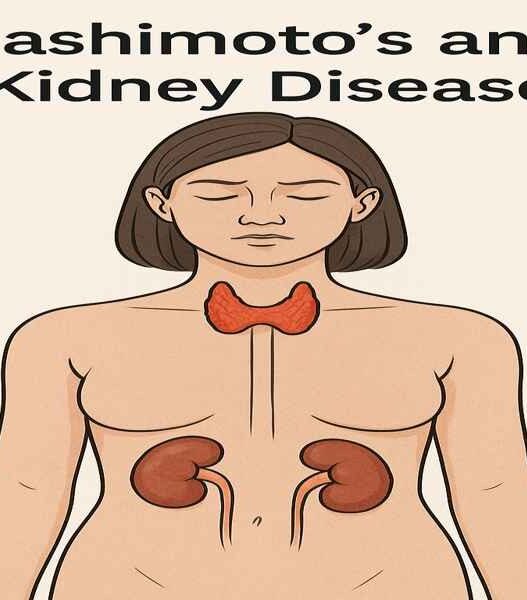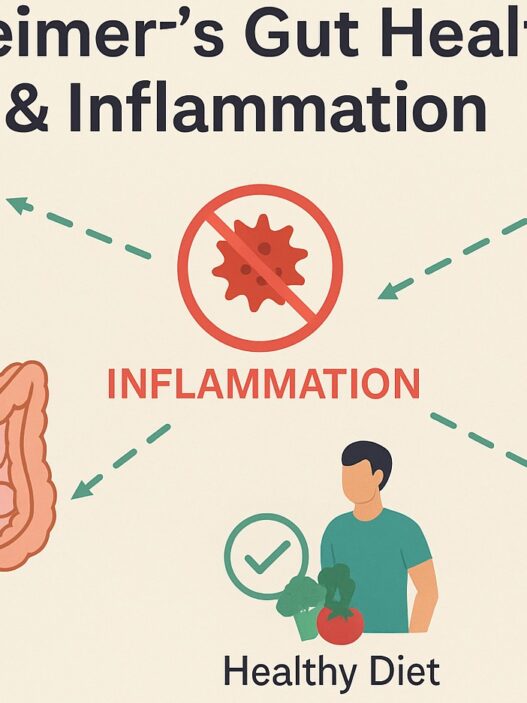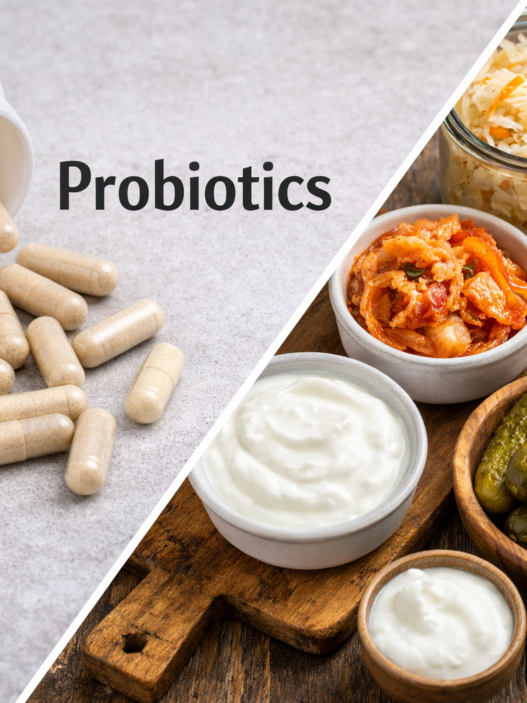Thyroid Hormone Conversion T4 to T3: How Inflammation, Gut, and Liver Health Play a Role
When I was first diagnosed with Hashimoto’s, doctors told me my TSH was high and prescribed levothyroxine. I expected my energy to return quickly. Yet I stayed tired, foggy, and cold. That’s when I learned the truth: thyroid hormone conversion matters more than just having T4 in the blood. T3 is the active form, and without proper thyroid hormone conversion, symptoms remain.
Conversion of T4 to T3 is the most important step in thyroid health. T4 is mostly inactive, while T3 powers energy, metabolism, and brain clarity. If conversion stalls, symptoms persist even with medication. Inflammation, gut health, and liver function decide whether T4 becomes active T3 or blocks as reverse T3. I share this in my book From Pain to Wellness: Overcoming Autoimmune Diseases, an Undisclosed Epidemic because it was a missing link in my healing.
Why Thyroid Hormone Conversion of T4 to T3 Matters
The thyroid mainly produces T4, which is inactive. Thyroid hormone conversion turns T4 into T3, which powers metabolism, mood, and brain clarity. About 80 percent of T3 comes from conversion in tissues like the liver and gut. Only a small portion comes directly from the thyroid gland. If thyroid hormone conversion is poor, Free T3 falls, and symptoms show up. Conventional medicine often checks only TSH and Free T4. Without Free T3 and reverse T3, the picture is incomplete.
Struggling with low T3? Get the Thyroid Hormone Conversion in your inbox
Join my list to receive tips and new blogs about thyroid hormone conversion and wellness.
No spam. Unsubscribe anytime.
Reverse T3 in Thyroid Hormone Conversion
Not all T4 turns into T3. Some of it becomes reverse T3 (rT3), which is inactive. Reverse T3 blocks the receptors, preventing T3 from working. This means thyroid hormone conversion is not just about producing T3 but also about avoiding too much rT3. Stress, chronic illness, inflammation, or excess levothyroxine raise rT3 levels. Research shows that elevated reverse T3 has been associated with fatigue in treated hypothyroid patients.
Levothyroxine and Conversion of T4 to T3
Levothyroxine is synthetic T4. Doctors prescribe it to replace what the thyroid does not make. In theory, it should convert to T3. In practice, many patients convert extra T4 into rT3 instead. Symptoms often continue despite normal labs. Raising the dose may worsen this. Integrative doctors sometimes add liothyronine (T3) or natural desiccated thyroid to improve outcomes, though conventional medicine usually relies on levothyroxine alone.
Inflammation and Thyroid Hormone Conversion
Inflammation affects thyroid hormone conversion by altering enzymes called deiodinases. These enzymes decide whether T4 becomes active T3 or inactive rT3. High inflammation pushes more T4 into rT3 instead of T3. People with autoimmune conditions often feel this. Diet and lifestyle changes that lower inflammation can improve thyroid hormone conversion.
Research confirms that inflammatory cytokines such as IL-1, IL-6, TNF-α, and interferon-γ disrupt normal thyroid hormone metabolism by altering deiodinase enzymes. This shift reduces active T3 and increases reverse T3, contributing to persistent hypothyroid symptoms despite normal T4 levels.
Gut and Liver Health in Thyroid Hormone Conversion
The gut and liver handle much of the conversion process. Healthy gut microbes recycle thyroid hormones. Dysbiosis or leaky gut reduce this. The liver converts nearly 40 percent of T4 into T3. Fatty liver, toxins, or sluggish detox pathways weaken this function. Supporting digestion and liver health with nutrient-rich foods, hydration, and rest helps improve conversion.
Labs for Conversion of T4 to T3
A complete thyroid panel is essential. It should include TSH, Free T4, Free T3, reverse T3, and thyroid antibodies. This full view shows if conversion is effective. Too many people are told they are “fine” with normal TSH while still symptomatic. Looking deeper reveals the real story.
Nutrients for Thyroid Hormone Conversion
Thyroid hormone conversion depends on minerals and vitamins. Selenium is required for deiodinase enzymes. Zinc and magnesium support enzyme activity. Iron is needed for thyroid hormone production itself. Vitamin D, vitamin A, and B12 improve receptor sensitivity and energy metabolism. Without these nutrients, thyroid hormone conversion suffers even if medication is taken.
A Clinical Endocrinology review reports that selenium supplementation can lower thyroid antibody levels in Hashimoto’s and describes selenium’s role in the deiodinase enzymes that convert T4 to active T3. I also describe in From Pain to Wellness, Overcoming Autoimmune Diseases how restoring these nutrients improved my thyroid health.
Conventional Medicine and Thyroid Hormone Conversion
Conventional medicine usually prescribes levothyroxine, a synthetic T4. The assumption is that thyroid hormone conversion will supply enough T3. Doctors track TSH, and sometimes Free T4, but rarely Free T3 or reverse T3. If TSH is normal, treatment is considered successful. Yet many patients remain symptomatic. Some integrative doctors prescribe liothyronine (T3) or natural desiccated thyroid to support thyroid hormone conversion more directly. Integrative medicine looks at the bigger picture: inflammation, gut, liver, and nutrient status. This often bridges the gap between “normal labs” and wellness.
Struggling with low T3? Get the Thyroid Hormone Conversion in your inbox
Join my list to receive tips and new blogs about thyroid hormone conversion and wellness.
No spam. Unsubscribe anytime.
Conversion of T4 to T3 reflects the health of your whole body. If you have symptoms despite normal T4 or TSH, ask for a full thyroid panel.
Pay attention to inflammation, gut health, liver function, and nutrients. For more research and practical strategies, visit my Blog page or explore From Pain to Wellness, Overcoming Autoimmune Diseases.



